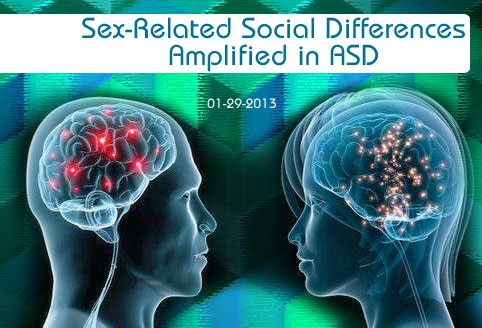Check out other stories from the Latest News
Sex-Related Social Differences Amplified in ASD
By Chelsea E. Toledo, M.A. on January 30, 2013

Background: Autism Spectrum Disorder (ASD) appears about four times more frequently in males than in females. In typically developing individuals, women often score better than men on tests for social cognition and empathy—traits for which autistic individuals often show deficits. Therefore, some researchers have suggested that ASD could be a disorder in which male social patterns in the brain are exacerbated, known as the “extreme male brain theory” of autism.
What’s New: On December 26, 2012, the online journal PLoS ONE published a study examining whether women and men have markedly different social brain functions and whether those sex-related differences are prevalent in individuals with ASD. The authors measured the brain activity, according to blood flow patterns in the brain, of 25 men and 22 women without ASD and observed patterned differences in the way male and female subjects made decisions based on facial expressions, especially in the inferior frontal cortex of the brain. They repeated the same test on twelve men with ASD and found that their inferior frontal cortices were more active than their twelve male counterparts without the disorder.
Why it’s important: This study offers one line of support for the “extreme male brain theory” as an explanation for why ASD is more common in males than in females. Important questions remain about the causes of amplified male social patterns in ASD and preventative or therapeutic measures that can be taken.
Help me understand :
| Source(s) : |
| Tweet |

